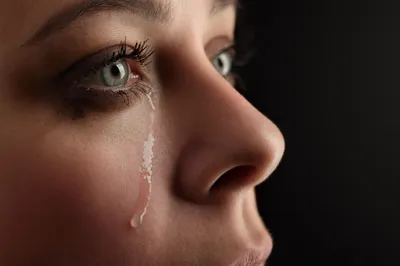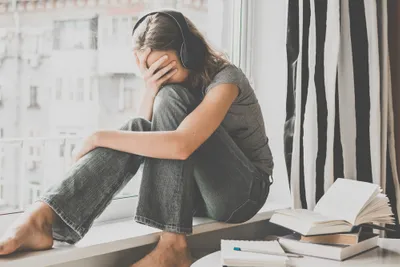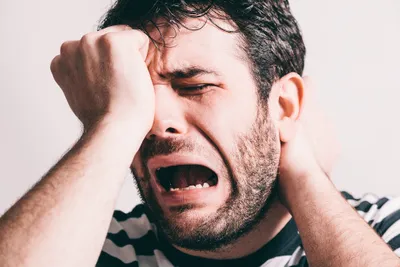Sometimes you might feel like you need a good cry after a fight with your spouse or a particularly difficult day at work. However, as opposed to infants, who cry in response to physical needs, such as they’re hungry, sleepy, or in need of a dry diaper—adults tend to cry in response to intense emotions.
Science is finally uncovering some of the mystery behind grown ups shedding tears…
1. We Cry Different Types of Tears
You might cry during a sad movie (any movie about animals turns me into a total sop), out of pure frustration, or when you read your wedding vows, but did you know that tears shed from anger, joy, and sadness differ from tears shed when you encounter brisk wind or chop an onion?
Clinical psychologist researchers at Tilburg University, in The Netherlands, break tears down into 3 distinct types. First and foremost, emotional tears (or lacrimal tears) are feeling-based and are spilled due to intense feelings of sadness, loss, laughter, pride, empathy, or joy by the lacrimal glands or tear ducts. Basal tears, or eye lubricating tears are shed to guard against irritations (there’s that onion again), triggered as a protective mechanism by glands under the eyelids.
2. The Science Behind Ugly Crying
We’ve all been there and done that, but when we cry, like really cry and gush with our eyes and nose spilling snot all over the place, we do so for good reason. It turns out that once the eyes reach drainage capacity—the nose springs forth to lessen the drippy load.
According to Dr. Nick Knight, a UK-based physician, emotionally tied tears that spring from the lacrimal gland (under the eyelid) has one of 2 drainage options—“[either] to drain-off down the lacrimal punctum (i.e., like a plug in your sink) or draining through your nose. And that’s why your nose runs when you have a good old sob-fest, folks.
3. Theory Behind Needing a Good Cry
Crying feels cathartic in nature, meaning it’s cleansing and offers a physical release to an emotional upset. However, hard science doesn’t back up the theory that crying releases stress—or stress hormone.
However, some doctors, theorize that crying triggers the release feel-good endorphins, similar to exercise. Dr. Judith Orloff, an Assistant Clinical Professor of Psychiatry at UCLA and the author of Emotional Freedom: Liberate Yourself From Negative Emotions And Transform Your Life, claims that we cry sometimes because it feels good.
4. The Cry (or Tie) that Bonds
It’s difficult to witness someone crying, especially someone you care about, without feeling empathy. We even feel for crying characters we watch on television and sobbing strangers we see in photographs.
Recognizing a fellow human in pain, in need, is a call most of us would answer…or at least have a response to. According to the journal, Neurophilosophy, when we see someone in pain, it’s human nature to put ourselves “in their shoes”. Certain areas of the brain are triggered to share in and process their experience.
5. Man Cry vs. Woman Cry
Bob Marley sang, “no woman, no cry” but research from scientists a the University of California, San Francisco, suggests the actual crying that takes place in males vs. females is very different starting with the size of the tear glands. For instance, a group of neuropsychiatrists who studied crying at the University of California, San Francisco, found that women just cry more simply for the fact that their tear ducts are smaller.
Physically speaking women’s tear glands reach capacity and spill onto the face faster. Psychologically speaking, social conditioning is also a big factor. It’s not as socially acceptable for men to cry opening, they tend to restrain their impulse to cry—while crying for women carries less stigma. The study showed that women tend to cry much more due to helplessness while men will cry when feelings of mortality, altruism, and camaraderie arise.
6. Crying and Hormones
Ask a woman who’s gone through menopause why she broke down into tears for no apparent reason and she’ll tell you—hormones! Research from the American College of Obstetricians and Gynecologists blame the shifting levels of the hormones estrogen and progesterone on the weepy, cranky rollercoaster ride that is menopause.
Hormones affect us all. However, studies show that it might not be too much estrogen that causes one person to weep more than another as much as higher testosterone in males might help them tune out emotions and avoid situations that would make them cry in the first place.









